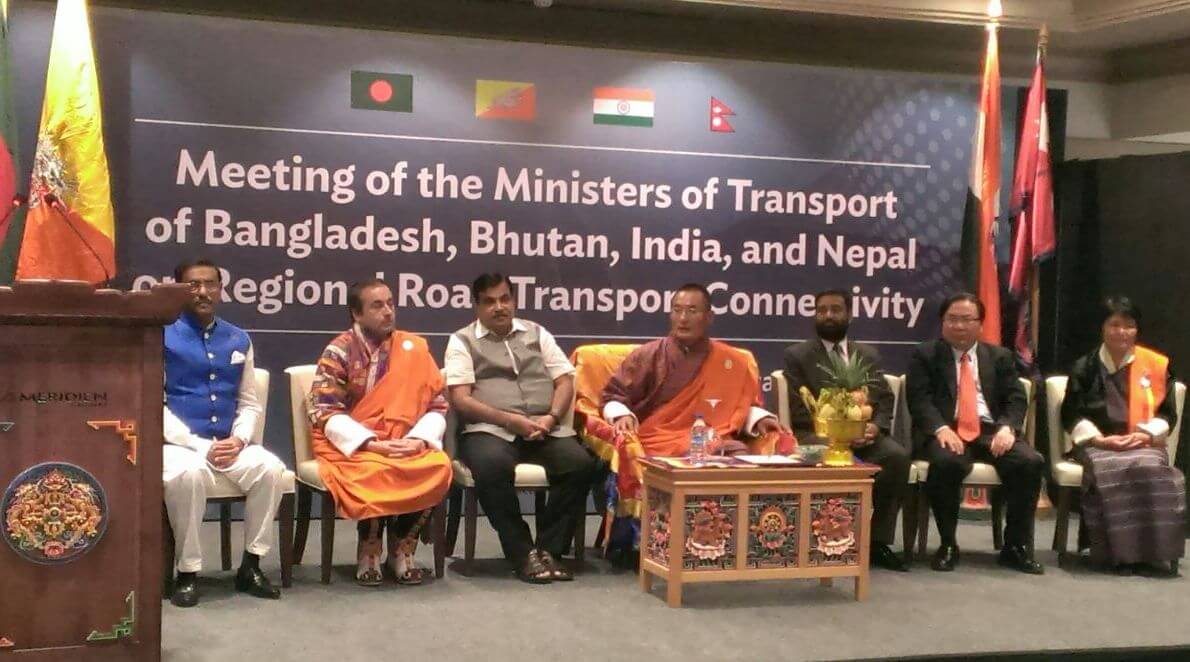Bhutan observed from the sidelines as India, Bangladesh, and Nepal finalised the Motor Vehicles Agreement (MVA), prioritising the maintenance of its status as a carbon-negative nation.
A meeting of India, Bangladesh, and Nepal on the BBIN MVA was held at New Delhi on March 7-8, 2022. Bhutan participated in the meeting as an observer: Ministry of External Affairs (MEA) pic.twitter.com/RQlfmAeB7Z
— ANI (@ANI) March 8, 2022
The discussions saw the participation of Indian Joint Secretary of the Ministry of External Affairs Smita Pant, Bangladeshi Director-General (South Asia) of the Ministry of Foreign Affairs Rokebul Haque, and Nepalese Joint Secretary of the Ministry of Physical Infrastructure and Transport Keshab Kumar Sharma. Furthermore, the First Secretary of the Royal Bhutanese Embassy in New Delhi, Thinley Norbu, joined in as an observer, along with representatives from the Asian Development Bank, which provided technical and knowledge support to the BBIN (Bangladesh, Bhutan, India, and Nepal) members.
One of the critical terms of the MVA was the finalisation of the Passenger and Cargo Protocols that deals with regulating passenger, personal, and cargo traffic.
According to Nepalese Joint Secretary Sharma, members aim to “operate the Kakarvitta-Kolkata-Dhaka or Biratnagar-Kolkata or both the routes in the next six months.” However, the project will only be implemented after receiving the approval of two sub-committees that will be set up in each country to look into transport and custom-related issues.
Bangladesh, India & Nepal, finalized an enabling MoU for implementation of the #BBIN Motor Vehicles Agreement (MVA) at a meeting in New Delhi on 8 March. [1/2]#NeighbourhoodFirst@MEAIndia@PMOIndia pic.twitter.com/F163oCf06K
— IndiaInNepal (@IndiaInNepal) March 10, 2022
The three countries (🇧🇩🇮🇳🇳🇵) agreed on specific steps to operationalize #BBIN MVA & recognized that it will ease cross-border transportation in the region and unlock its growth potential.
— IndiaInNepal (@IndiaInNepal) March 10, 2022
For more details: https://t.co/jK86JSSRwD
[2/2]#NeighbourhoodFirst@MEAIndia@PMOIndia pic.twitter.com/S62E9NKXGb
The BBIN sub-regional grouping was set up following the failure of the South Asian Association for Regional Cooperation (SAARC) to establish a connectivity agreement during its Nepal summit in 2014, largely due to Pakistan’s resistance. The four countries signed the BBIN MVA in 2015; while signing the agreement, Bhutan clarified that its obligations under the agreement were subject to domestic ratification.
In this respect, Bhutan’s failure to secure sufficient backing from its Parliament to ratify the MVA back in 2017 threatened the success of the project. However, erstwhile Bhutanese Prime Minister (PM) Tobgay Tshering said that the other three South Asian countries would be allowed to go ahead with materialising the agreement even in Bhutan’s absence.
In 2020, incumbent Bhutanese PM Lotay Tshering announced that in light of Bhutan’s “current infrastructure,” it would not be considering joining the MVA and that it would instead focus on remaining a “carbon-negative” nation. Following Thursday’s meeting, the other three countries have continued to move ahead with the agreement “pending ratification” by Bhutan.
Apart from the hindrance caused by Bhutan, the BBIN MVA has several other obstacles to overcome. For instance, according to The Hindu, the three countries have been struggling to finalise protocols on several issues, including insurance, bank guarantees, and the size and frequency of freight carriers into each BBIN member’s territory. However, despite the slow progress, the countries remain hopeful that the terms of the agreement will be finalised within a year.

